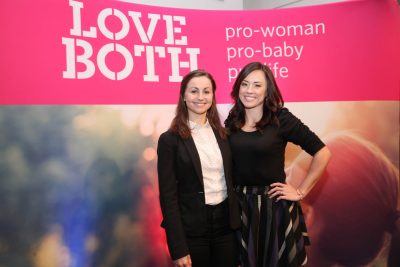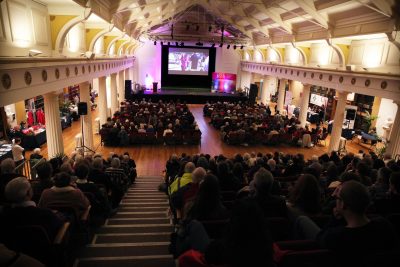
By Katie Ascough - 12 November, 2019

Pro Life Campaign National Conference, 2019. Katie Ascough (left), Ashley Bratcher (right).
The Pro Life Campaign (PLC) National Conference was addressed on 2 November by Ashley Bratcher, lead actress in the film Unplanned.
Ashley thanked the 800 attendees for the success of the film in Ireland and encouraged them to promote the DVD of the film when it is released here in the coming months.
She challenged everyone to reach out to pro-abortion friends and encourage them to watch the film and start a conversation on the issue.
In an interview with CatholicIreland.net, Ashley said that pro-life activism was never on her agenda, much less playing the lead role in a film about a woman’s pro-life conversion. She credited a friend on Instagram who said, “I feel like God is telling me you’re meant to play this role.” Thinking she was insane, Ashley blew it off, but a couple of weeks later she followed up and read the script.
Describing the first time she read the script for Unplanned, Ashley said, “All I really knew about Abby Johnson was that she worked at Planned Parenthood and she was really funny and witty, but I didn’t know she was a real person. I got online, I looked her up, and when I heard her testimony, that was when I was really blown away. Because I was one of those people who was middle of the road. I didn’t really know what happened during an abortion procedure. When Abby described it I just thought how blinded I had been … And that made me want to give the story a voice.”
Ashley shared her own moving personal story during the interview and described her journey in the pro-life movement as “crazy”. On the fourth day of filming Unplanned, Ashley received a phone call from her mother, who had no idea where she was, as she had booked the role and hopped on a plane within a few hours.
“Everything happened really fast,” Ashley shared, “And so when I talked to my mom … I hesitated because she had had an abortion when she was 16. I knew that. And as I told her Abby’s story she got emotional; I could hardly understand her, and she said, ‘Ashley, I need to tell you something. What you don’t know is that when I was 19 I was in the abortion clinic for the second time. I was called back to be examined. I was on the table when I got up and I decided I couldn’t do it and walked out and I decided to have you.’
“Hearing that story, it put things in perspective for me. And when I got asked how that felt, the only way I can explain it is like having a near-death experience. You think back on all the things that you’ve done in your life, and the relationships you have, and to have a moment when you realise that could have never happened – it just blows my mind … It was another thing that just empowered me in the moment and made me want to fight harder so that people understand the value of human life.”
Ashley admitted this was her first trip to Ireland, but in her enthusiasm for the country she exclaimed, “I think that I’ve decided when my husband and I retire we’re moving here. I want a cottage out in the countryside and I want a farm and this will be my life. I love it here, I really do. It’s beautiful.”
Her message for Irish people in the wake of the repeal of the Eighth Amendment was, “Don’t lose hope.” Ashley shared that she has felt discouraged in her own pro-life journey, which has only been just under two years long to date. She said it is easy to get passion fatigue, where you feel like your voice isn’t being heard, but then you meet that one person whose life you changed. “They say that because of what you shared with them they’re going to keep their child. And even just because of that one person changing their mind – it’s saving a life – it’s so worth it. So don’t give up the fight. Keep hope,” Ashley prompted the Irish pro-life movement.

Ashley Bratcher with students at Pro Life Campaign National Conference, 2019.
“And I think the way to really win this is to treat people with love and kindness, because no one can argue with that. Providing resources for women – in the States we have so many pregnancy resource centres – and no one can argue with doing good for women.”
Ashley also spoke about her new scholarship programme, which she plans to make global: “It provides financial funds for women who have chosen to have their children and they want to pursue their degrees or finish school. So it will help them financially, but it will also connect them to a pregnancy centre in their area where they get mentored, have parenting classes, and get resources. Even pro-choicers in the States are behind it.”
On the subject of faith and abortion, Ashley shared her approach to talking with those who claim to have faith and yet stand for abortion: “What I’ve said to them is you have to support what you believe; if you say you’re a Christian, you have to be able to support it with the Word of God. And when you look at the Bible, it says in Jeremiah, ‘I knew you before I formed you in your mother’s womb. I set you aside and gave you a purpose.’ And I don’t know why [God] would say that it is a life if it didn’t have value … So in order to claim faith and to be a Christian, you’re going to have a really hard time arguing for abortion.”
In relation to the recent legalisation of abortion in Northern Ireland through Westminster, Ashley said, “I don’t think that laws really change hearts. I think that culture is where you’re going to affect people the most. And the way that you change culture, in my opinion, is through story-telling, your testimony; and again, going back to treating people with love, respect, and kindness. Because no matter what the law is, even if you make abortion illegal, people are still going to seek abortion in desperate situations, so this movement is about compassion, really, and unity — making sure we are a unified movement that stands together and says, ‘No, we love you and we love your child, and we are going to do everything we can to support you’. So I definitely sympathise, but I also don’t think the law has the power to change people’s hearts, and that’s where this issue lies.”
On the topic of censorship and media bias, Ashley shared her view: “I was just discussing maternal death rates and what I learned about Ireland was that you were one of the safest countries in the world when abortion was illegal. So if you look at the correlation I think it’s really interesting, and I am not sure that the general public is aware of that. I certainly wasn’t – that was news to me. I’m not from Ireland, but I can imagine with your media being so liberal, it sounds like a lot of conservative voices and pro-life voices are censored.”
When asked what the main impact and effect of abortion was, Ashley said, “It’s a ripple effect. I have not met any [post-abortive] woman who doesn’t have some sense of regret in their story. I have heard some women say, ‘I don’t regret it’, but when you ask them if the situation or the circumstances were different would they have kept their child, most of them say yes. So, to me, that is kind of counter-intuitive to saying, ‘I don’t have any regrets’, because if the situation had been different you would have given your child life.”
She continued, “I also think it’s sad that men don’t really have a say, because a lot of men are affected by that loss and it’s sad that their voices are oppressed. I think that if more men did speak out, it could potentially empower women. And I think the most empowering thing that a woman can do is choose life for her child. That’s a very sacrificial thing.”
Many people, from news anchors to friends and family, have asked Ashley whether she fears her involvement in a film about abortion could harm her career. Her response to the question was nothing but upbeat and positive: “I didn’t hesitate for a second because of my faith. I had been preparing, I think, without knowing, for several years. God had put it on my heart that in my career [God] wanted to take me somewhere that I wasn’t ready to go. And that idea of missing out on what God wanted for my life really woke me up. I thought, ‘Well, if God wants to take me somewhere, and I have this feeling, then I really want to go where [God] has to take me’, and when I got the phone call and I was told, ‘You may be blacklisted, you may never work again’, because I know my identity is rooted in Jesus Christ and what he says about me, it didn’t matter what society was going to think or what the film industry was going to think of me. It was a story that I knew that God ultimately would want told to the world.”
When asked what was next on the horizon, with the possibility of a break included in the question, Ashley replied, “You know, I thought about a break, but it just doesn’t seem to happen, right? That’s not happening!” she laughed.

Eight-hundred attend Pro Life Campaign National Conference, 2019, with Ashley Bratcher.
“A lot of doors and opportunities have presented themselves that I never in my wildest dreams would have thought would happen. My career is only getting better and better and better. I’m actually in early development to produce a movie, which is super exciting because I never would have had an opportunity like that without doing Unplanned. Even pro-choicers are still receiving me well. I’ve had some really incredible auditions, still … A book, maybe. I don’t have time for one right now – my husband would kill me.”
When asked if there was anything else she would say to the people of Ireland, she smiled and said, “‘I love you, Ireland’ is what I would say. It’s an enchanting place to be. When we were at the cliffs of Moher I looked out and I couldn’t think of how it felt, and it hit me finally – I can only describe it as if I were standing in front of a painting that God created. How beautiful it is; I’ve never experienced something so beautiful … and everyone is really nice so far. I haven’t encountered anyone mean, so there’s no mean Irish people in my opinion!”
To watch the PLC’s full interview from the conference with Ashley Bratcher, hosted by Wendy Grace, click here.